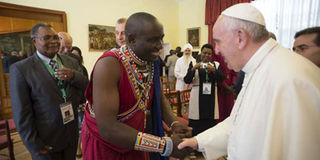Has the Pope’s message been forgotten?

Pope Francis is greeted during a meeting with inter-religious and ecumenical representatives at the apostolic nunciature in Nairobi, Kenya, November 26, 2015. The Catholic Bishops have promised a ‘comprehensive pastoral response’ to the Papal visit. FILE PHOTO | REUTERS
What you need to know:
- Selective management of once off events should never be mistaken for good governance.
- They came bearing challenging messages for the political and religious establishment on the triple vices of endemic corruption, ethnicity and poverty.
- There has been a noticeable silence from the church on corruption yet Francis’ views on land grabbing, evictions and poverty in Kangemi are consistent with his belief that slum dwellers are treated as ‘half or non citizens’, urban remnants of a society that has globalised indifference.
Last year, Kenya hosted President Obama, Pope Francis and the World Trade Organisation (WTO) in a manner that showed the world what it can do when it wants.
However, gloating over these successes can give the country an exaggerated sense of achievement and be used to conceal the obvious cracks that need urgent attention if Kenya is to soon develop into a middle income country.
Selective management of once off events should never be mistaken for good governance.
Would you rather Kenya was known as a global event’s organiser or a country of justice, freedom and equality?
Why can the country shine before a global audience but fail to even collect its garbage or repair potholes on a regular basis?
In other words, why can the country perform so brilliantly when it chooses but fail to make good choices a daily habit?
Is this tendency of pulling out all the stops for the visitor while neglecting the fellow Kenyan a legacy of colonialism?
Then again, the esteemed visitors didn’t just come because they like the country, its people and climate or to praise their hosts.
They came bearing challenging messages for the political and religious establishment on the triple vices of endemic corruption, ethnicity and poverty.
But did Mr Obama or Pope Francis make any real impact on the nation beyond the feel-good factor?
Are politicians and religious leaders really convinced of the urgency to address these evils or are both sectors living comfortably in partnership?
CONSIDER THE POOR
The Catholic Bishops have promised a ‘comprehensive pastoral response’ to the Papal visit but perhaps the Pope was demanding something more that would impact on the whole of society and not just confine itself to the Catholic faithful.
There has been a noticeable silence from the church on corruption yet Francis’ views on land grabbing, evictions and poverty in Kangemi are consistent with his belief that slum dwellers are treated as ‘half or non citizens’, urban remnants of a society that has globalised indifference.
Any response to Francis challenges must be radical, new and subversive, viewing life from the perspective of the poor, not from the viewpoint of the powerful, elites or media.
In the words of liberation theologians, there is no salvation outside the poor, and the poor are a crucified people who can easily identify with the child Jesus born in a stinking stable in Bethlehem.
That is not to deny progress made in the country but there is an urgent need to reverse history and to place the needs of the poor as the starting point for any meaningful development.
The hierarchy should not be seen then to be identified with either Cord or Jubilee but must take the side of the poor, dispossessed, unemployed and sick.
That is what prophetic leadership requires.
Will it happen? Bishops are rarely appointed because of their boldness, courage or defence of the poor.
The first requirement is usually a safe pair of hands.
Yet, recall that Oscar Romero of El Salvador was about as conservative choice as one could imagine, but circumstances made him a hero and martyr.
Francis, too, had a Damascus moment that propelled him to greatness and service. There is still hope.





